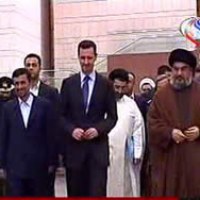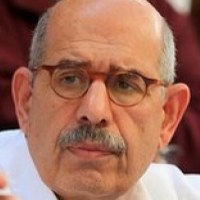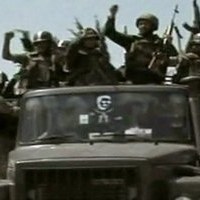![]()
Mon, July 11, 2011 | Rubin Reports | By Barry Rubin
Syrian Revolutionary Song Says It All
Wow, watch the less-than-four-minute video below and you get the flavor of the Middle East and the “Arab Spring” in every respect. It’s an amazing story.
First, there are the masses of people in the Hama square, as far as I can see they are all male and all dressed in Western clothes, the latter point contrasting with the more pious Egyptian counterpart. They are jammed together, they are happy, celebrating, and fearless in their opposition to a terrible dictatorship. It is truly inspiring. If Obama made a thrill go up the leg of a well-known MSNBC host, this video made my spirit soar.
Remember, this is Hama, the city where the regime murdered between 10,000 and 20,000 people in 1982, levelling large whole neighborhoods, because of a very small-scale Muslim Brotherhood insurgency. Without taking anything away from the real sufferings of Egypt’s people, Syria is a real police state on a level with Stalinist Russia and Saddam’s Iraq; Mubarak was a sweetie in comparison to the Asad regime in Syria.
To go into Tahrir Square in Cairo was to take some risk; to go into Hama’s square like this you better write your will beforehand. In fact, the author of this song, a local singer, was already killed by the regime before this recording was made.
Yet how can you have a revolution — or anything in the Middle East — without blaming the United States? The words call dictator Bashar al-Asad and his colleagues American agents. Get it? In Egypt, the Obama Administration backed the revolution and the result is massive anti-Americanism.
In Syria, the Obama Administration (let’s face it, despite the minor squeaks of dismay from the White House) backs the dictatorship and the result is massive anti-Americanism. And for balance, the United States also gets no street credit for the policy of President George W. Bush for the toughest anti-regime policy in history.
So these are the paradoxes of the region: anti-Americanism if you do; anti-Americanism if you don’t. An inspiring massive upwelling of popular demands for freedom but with the Muslim Brotherhood and all type of extremists waiting to seize power. The hope for real democracy and the shadow of just another repressive dictatorship.
Still, watch this video for one of the more glorious moments in the modern history of the Arab peoples. (Note the “s” in people, contrary to Arab nationalist ideology.
httpv://www.youtube.com/watch?v=_mluOJvZhaA
Read also this article in Foreign Policy about this song, Fri, July 08, 2011 | Is this the anthem for the Syrian revolution? | By Robert Zeliger
Crowds have chanted it at rallies throughout the country these past few weeks, and thousands more have listened to it and shared it online. “Yalla Erhal Ya Bashar” (It’s time to leave, Bashar), seems to be the standout song of the Syrian uprising so far. With simple, catchy, sometimes profane lyrics, the song tells the Syrian leader to “screw” himself. “Freedom is near.”
The story of the song’s author — Ibrahim Kashoush — took a sad turn with news that he may have been killed in a protest last Friday in Hama. Reporting out of Syria is hard to verify these days, but one Lebanese news site said his body was reportedly dumped in a nearby river Wednesday morning.
“The song has rallied people,” said U.S.-based Syrian activist Ammar Abdulhamid. “It hit a nerve because it’s clearly and simply designed to tell Assad to leave. It’s very straightforward. And it uses some profane language.”
Abdulhamid said there have been other protest songs before this one, but “Yalla Erhal Ya Bashar” stands out as the best.



 RSS
RSS











Syrian Revolutionary Song Says It All | #Syria #Democracy #Assad http://bit.ly/pv8TiM
Syrian Revolutionary Song Says It All | #Syria #Democracy #Assad http://bit.ly/pv8TiM
It was really nice to read this artilce, but I have some comments on it.
first, what do you mean by “dressed in Western clothes?” that’s the usual way of dressing in Syria, Egypt, and most of the Arab countries. There’s nothing unsual in that.
Another thing is, it’s true that the Muslim Brotherhood still exist in Egypt, but I still don’t see why you should think of them as a threat. Firstly, they have been more inclined to the political ways rather than the military way, and secondly, you can just think of them as any other party. Being a young girl from the Midde East I can tell you that we are sick of any type of war. We just need a chance to build our own countries peacefully, and freely.
One last thing, I haven’t heard in any of the countries involved in the Arab Spring that America has been blamed. Nobody blamed them in Egypt, and they even carried their flag in Lybia. In Syria, and despite the fact that we really appreciate the visit of your ambassador to Hama, we haven’t really seen a big difference in the American government opinion of the decator regime in Syria. After the growing number of killed people, and the horrifying stories of torturing children, and other terrible things, your government still expect reform??!!! Can that be plausable?
The world is damned silent towards what’s happening in Syria. Nobody wants you to bring your troops to our country, but you can at least stop these murders????
You answer your first question yourself: western clothing is the usual way to dress in most Arab countries. But the point here is that during the Tahrir Square protests in Egypt against Mubarak’s regime more and more Islamists in traditional Islamic dress joined the protests and in the end these Islamists (Muslim brotherhood, Salafists) hijacked the Egyptian Revolution, while in this video these traditional dressed Islamists are absent in this anti-Assad protest in Hama. As you may know, Islamists view “western clothing” as evil within Islam.
Concerning the Muslim Brotherhood: if you could achieve a totalitarian Islamist regime based on Sharia law by political means, would you still opt for a military coup or terrorist attacks? No, you wouldn’t. The Muslim Brotherhood didn’t reject violence and terrorism, because they didn’t like it, but because they understood they could achieve their goals by political means. If you still think of the Muslim Brotherhood as any other political party, you need to read more about the Muslim Brotherhood.
So, for example when Mubarak is depicted as an american and Israeli agent during the Tahrir Square protests, you don’t think this is blaming the U.S. and Israel for supporting Mubarak in the past?
But you’re right about U.S. policy towards Assad’s regime during the Syrian protests: Obama didn’t do much to support the Syrian protests against Assad in contrast with U.S. support for the Egyptian Revolution against Mubarak and against Gaddafi in Libya.
that is the act of royial arabic blood